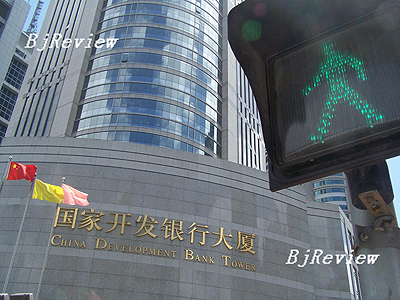
China was in the spotlight when it decided to invest $3 billion of its stockpiled foreign exchange reserves in the U.S. private equity firm Blackstone in May before its June IPO. The country has recently drawn worldwide attention again, this time for a large-scale overseas investment by a state-run bank.
On July 23, the China Development Bank (CDB), one of the country's three policy banks, and British bank Barclays, came to an agreement under which CDB would become a major shareholder and strategic partner of Barclays. As part of the deal CDB was also invited to participate in Barclays' bid for Dutch bank ABN AMRO.
"The agreement with China Development Bank provides Barclays with unprecedented access jointly to provide financial services to the rapidly growing Chinese market and Chinese companies trading internationally," said Bob Diamond, President of Barclays.
"This strategic and financial collaboration is the next step in the evolution of China Development Bank into a commercially operated financial institution," said CDB Governor Chen Yuan.
Banking experts all consider CDB's move a meaningful trial during its transition from a policy bank to a commercially operated bank. While helping domestic companies obtain advanced management experience and explore overseas markets, this kind of investment can also alleviate the pressure of imbalances in the country's international payments.
The largest-ever overseas purchase
According to Barclays' announcement on July 23, CDB will invest 2.2 billion euros ($3 billion or 1.5 billion pounds) in Barclays through an initial purchase of 3.1 percent of Barclays existing issued share capital, at a price of 7.2 pounds per share on August 14, 2007.
CDB has also agreed to invest up to a further 7.6 billion euros ($10.39 billion or 5.1 billion pounds) in Barclays at a price of 7.4 pounds per new ordinary share conditional on the completion of the merger with ABN AMRO, of which 1.8 billion euros (1.2 billion pounds) will be made available for clawback, outside of the United States, targeted at existing Barclays shareholders.
CDB's resulting shareholding in the combined group would be 6.3-7.7 percent. And CDB will also be entitled to nominate a non-executive director to the Barclays Board.
Along with CDB, Singaporean Temasek Holdings (Private) Ltd. will also become a major shareholder in Barclays through an initial purchase of 2.1 percent of Barclays current issued share capital.
On July 25, Barclays further announced that, as a result of clawback placing, CDB and Temasek offers have been scaled back.
Upon the completion of the proposed merger with ABN AMRO, CDB will now buy a total of 4.31 billion pounds worth of Barclays shares. If the revised offer for ABN AMRO is successful, CDB will, upon completion, have a shareholding of 6.7 percent.
CDB's investment in Barclays is the largest overseas merger and acquisition (M&A) deal since China's reform and opening up, said Wang Yuanlong, an expert on international finance.
According to statistics from Dealogic, a leading supplier of management software and information systems for the investment banking industry, published in Shanghai Securities News, among all M&A cases finished or to be finished by Chinese mainland companies, the largest previous M&A was completed by China National Petroleum Corp., whose wholly owned subsidiary PetroChina International acquired Calgary-based PetroKazakhstan Inc. for $4.18 billion in August 2005. Dealogic data also showed that the state investment company's investment of $3 billion in Blackstone ranked the fourth.
A stepping-stone
Compared with Temasek's investment, CDB's holdings of Barclays also have some strategic significance. In their agreement, it's stated that, "Barclays will assist and advise CDB in its evolution into a commercially operated financial institution."
At the beginning of this year, the Chinese Government decided to transform its policy banks by first promoting the commercial operation of CDB.
In May CDB gained approval to establish the China-Africa Development Fund, and in June CDB became the first domestic bank to issue yuan bonds in Hong Kong. While these are innovations in its businesses, partnering with Barclays can help CDB transform its operation mechanism.
"It is an inevitable trend that Chinese financial institutions
| 